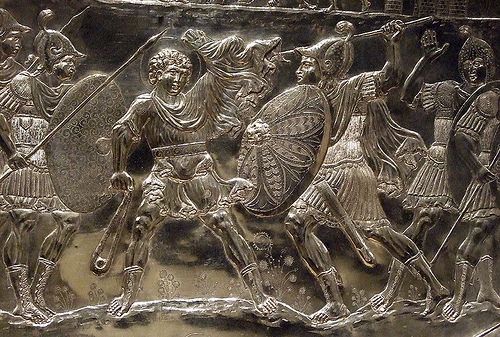One common challenge posed by skeptics is to impugn the goodness of God using difficult passages from the Old Testament. Some of these challenges are trivial; for example, the challenge of 2 Samuel 12:31. In the KJV, this verse reads,
“And he [David] brought forth the people that were therein and put them under saws and under harrows of iron and under axes of iron; and made them pass through the brickkiln; and thus he did unto all the children of Ammon.”
Skeptics understandably find it distasteful that David, a man after God’s own heart, would engage in torture, even of the enemies of Israel. However, upon a closer look, we find (surprise!) that the language spoken in 17th century England, when the KJV was translated, was a little bit different than what we speak today. When we examine this verse in the more updated HCSB, it says,
“He removed the people who were in the city and put them to work with saws, iron picks, and iron axes, and to labor at brickmaking. He did the same to all the Ammonite cities.”
This paints a completely different picture than the aforementioned surface-level slam on David’s ethical standards.
However, some other examples are not quite so easy to dispel. Some common accusations deal with God telling the Israelites to kill all their enemies, as in Deuteronomy 25:17-19 and Deuteronomy 7:1-6, including all of the children. Answering such emotionally volatile objections require a great deal of tact and sensitivity.
First, it’s important to distinguish between what the Bible records and what the Bible commands. Asserting that because God told the Israelites to do this means that Christianity is okay with going out and murdering random people is rather obtuse and misses the point entirely. It’s misleading to compare an ancient theocratic nation and a modern individual on the same terms.
Secondly, it’s noteworthy that the Ammonites had been relentlessly attacking the Israelites for 400 years prior to this edict from God. Moreover, they were using extremely underhanded tactics like sneaking up on the Israelites from behind and killing off the slowest among them such as the elderly, children, and pregnant women. There was no Geneva Convention back then and to say that the Ammonites had zero respect for human rights was an understatement. In this time in history, each nation must either defend itself or be wiped out entirely.
They assert that a loving God would never tell anyone to commit murder. These arguments can be emotionally compelling, but are fundamentally flawed in their understanding of God’s nature. To describe God as loving is both accurate and incomplete, since in addition to being loving, God is both holy and a Creator. Both of these have important implications for the subject at hand.
God’s holiness mandates that systematic, ingrained evil practices will not be allowed to endure indefinitely. Moreover it’s crucial to understand that there is a difference between maniacal, capricious genocide and forewarned judgment on an evil system, as God’s judgment on these nations was certainly the latter. His objective was not to randomly murder people He didn’t like but to eradicate an unjust, wicked culture with unjust, wicked practices. There is no recorded instance in the Bible where God does not protect a repentant individual who has turned from their sin from judgment. In fact, if the nation repents and turns from their evil, there will be no judgment at all, as in the case of Ninevah.
The fact that God is a Creator of life sets Him apart from us in certain ways. As humans, we cannot create life so it is wrong for us to destroy it. However, God can create life, and the implication of this is that it is not at all a double standard if God can destroy it. To insist that the same rules have to apply to God because they apply to us is a part-to-whole fallacy.
Finally, it’s of extreme relevance that the nations in question engaged in widespread, vile, and disgusting practices; for example, sacrificing live children to idols. God was avenging the innocent blood that these cultures routinely shed and ensuring that this custom had no chance of surviving.
Although the matter is far from settled, these responses will hopefully provide food for thought and a place to begin for further exploration of the topic.






